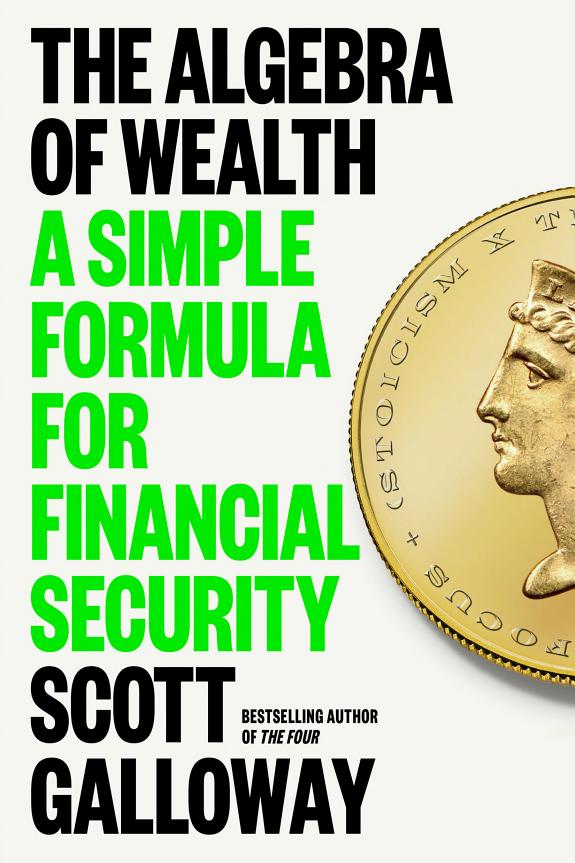Scott Galloway’s The Algebra of Wealth, published in 2023, isn’t your typical finance book. It’s a sharp, often contrarian, take on how to achieve financial well-being in a world increasingly defined by technological disruption and social inequality. Galloway, a marketing professor at NYU Stern School of Business and a prolific author known for his blunt and often humorous style, brings a refreshingly honest perspective to the often-intimidating subject of personal finance. He cuts through the jargon, offering practical, if at times provocative, advice rooted in his own experiences and observations of the modern economy. This book feels particularly relevant now, as many grapple with economic uncertainty and navigate an evolving job market, seeking concrete strategies rather than empty promises of overnight riches.
Galloway’s central argument isn’t about getting rich quick; it’s about building a solid foundation for long-term financial security. He breaks down wealth creation into a series of key components, focusing on the importance of hard work, delayed gratification, and making smart, albeit sometimes unglamorous, choices. He emphasizes the power of compounding, not just in terms of investments, but also in skills and relationships. His approach is not based on complex algorithms or high-risk strategies, but rather on a more fundamental understanding of the economic forces at play and how individuals can position themselves for success. Check it out on Amazon
The book isn’t structured like a traditional textbook, which is a great strength. Instead, it reads more like a conversation with a wise mentor. Galloway seamlessly weaves together his personal anecdotes with his analytical insights, making complex financial concepts more accessible. He discusses the importance of developing a marketable skill set, avoiding excessive debt, and investing for the long haul. He’s also not shy about highlighting the often-uncomfortable realities of wealth accumulation, such as the role of luck and the impact of structural inequalities, but also how individuals can navigate these systems to their advantage. There’s a refreshing directness to his writing, which many find engaging and persuasive.
One of the most compelling aspects of the book is its practical advice. For instance, Galloway advocates for the power of “playing the long game,” emphasizing that sustainable wealth is built through consistent effort and smart choices over time, not through speculative ventures. He provides a clear roadmap for building wealth, focusing on specific strategies, such as maximizing your earning potential by investing in your skills and networking, as well as avoiding high-interest debt and building a diversified investment portfolio. The advice is clear, concise, and immediately applicable. This is where the book shines, offering actionable advice rather than just theoretical concepts. You can explore more on Amazon
Galloway’s authority on the subject is undeniable. As a professor and serial entrepreneur, he brings a wealth of experience and knowledge to the table. He doesn’t just present his opinions as facts, but instead supports his claims with data and analysis. His arguments are backed by years of studying business and economics, which are also presented in an easy to understand way for the layperson. He uses real-world examples and case studies to illustrate his points, making the concepts more tangible and easier to grasp. He has also been very open about his successes and failures in life which add a level of credibility to his claims, making the advice feel grounded and realistic.
The writing style in The Algebra of Wealth is another key strength. Galloway’s voice is distinctive – sharp, witty, and unapologetically direct. He avoids overly technical jargon, making complex financial ideas accessible to a wide audience. The book is engaging and entertaining, and this prevents it from feeling like a dry finance textbook. Galloway’s use of humor and relatable anecdotes keeps the reader hooked, making the learning process enjoyable and insightful. He is not afraid to call out societal flaws, but also provides the tools to navigate them. He has a unique ability to make complex concepts feel both understandable and urgent.
One particular insight that resonated with me was his emphasis on the importance of “non-scalable” advantages – things like your unique skills, your relationships, and your reputation. In a world where everything is becoming increasingly automated, these are the factors that will truly set you apart. I found this to be a compelling argument that extends beyond finance and applies to many aspects of life. Galloway has this skill of taking something that seems complex and making it practical and simple to apply to everyday life. Amazon Link to Purchase
In conclusion, The Algebra of Wealth is more than just a personal finance book; it’s a roadmap for building a more secure and fulfilling life. It challenges conventional wisdom and offers a refreshing, no-nonsense approach to wealth creation. It’s a book that can benefit anyone, from young professionals just starting out to those looking to refine their financial strategies later in life. It provides a clear framework for thinking about money and wealth, and emphasizes the importance of long-term planning and consistent effort. It provides a refreshing perspective on finance that cuts through the noise and gets straight to the core principles of wealth building. Get your copy on Amazon
I would highly recommend this book to anyone interested in improving their financial situation. It’s especially valuable for those who feel overwhelmed or intimidated by the subject of personal finance. Readers who enjoy books like “The Psychology of Money” by Morgan Housel, or “Rich Dad Poor Dad” by Robert Kiyosaki would find Galloway’s approach equally compelling and insightful. The Algebra of Wealth is a practical, informative, and highly readable guide that will help readers take control of their financial futures. It’s a book that stays with you long after you finish reading it, prompting you to reflect on your own financial habits and make positive changes.

